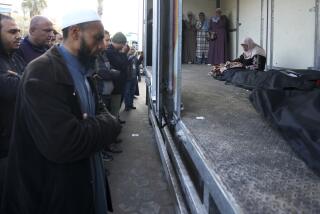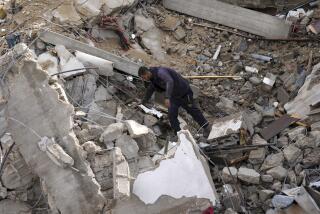Britain’s Leaders Stand Behind Afghanistan Attack
- Share via
LONDON — Britain’s political leaders threw their support behind the Anglo-U.S. military strikes against Afghanistan on Sunday after Prime Minister Tony Blair declared that the coalition will act with “reason and resolve” in response to the Sept. 11 attacks on the United States.
The opposition Conservative Party said the international coalition against terrorism is “seeking justice” for the nearly 6,000 civilians who died in last month’s assaults, while left-wing members of Blair’s Labor Party said a military response was necessary.
“People are behind the war because it’s right,” said independent military analyst Paul Beaver.
Nonetheless, the gravity of entering an open-ended war against Osama bin Laden’s Al Qaeda terrorism network and the Taliban government of Afghanistan set nerves on edge in a country that sees itself as a potential target of retaliation.
“The central worry is that a strong military reaction may be exactly what Al Qaeda wanted,” said Paul Rogers, a military and political analyst at Bradford University. “From their point of view, the more American forces you have in the [Persian] Gulf and Southwest Asia, the more anti-American sentiment you have and the better it is for people such as Bin Laden.”
British public opinion is with the government now, he said, but could be shaken by mass protests in countries such as Pakistan, Egypt and Jordan; increased unrest in Israel, the West Bank and the Gaza Strip; or another “paramilitary strike” against the U.S. or Western Europe.
In his speech Sunday to the British people, Blair tried to calm fears about retribution against their nation, saying that there was “at present no specific credible threat to the United Kingdom that we know of.”
Many Britons, however, noted the carefully qualified language and the extra police officers who were on duty in what Scotland Yard called “potentially vulnerable areas” of London.
The prime minister, who often exudes polish and charm in public discourse, was at his most serious and straight-talking Sunday night. He appeared tense as he explained that British forces had fired cruise missiles at Afghanistan from submarines in the region and would soon put reconnaissance planes and other aircraft into action with the United States. He did not say whether he would commit ground troops or whether British special forces have already entered Afghanistan, as some military analysts have speculated.
Although the political support in Britain is solidly behind Blair, said Hugo Young, a columnist for the left-of-center Guardian newspaper, “I think he realizes he is the auxiliary general in a very difficult battle. He’s seized what’s at stake here, the very real risk of things not working and people getting killed.”
Moreover, Young said, the goals of trying to track down one man in a mountainous country and launching a permanent war on terrorism “make it terribly difficult to succeed.”
Explaining why he had committed the country to the war, Blair said more Britons had died in the attack on the World Trade Center than in any single terror assault in British history.
“The murder of British citizens, whether it happened overseas or not, is an attack upon Britain,” Blair said. “But even if no British citizen had died, it would be right to act. This atrocity was an attack on us all, on people of all faiths and people of none. . . . Our prosperity and standard of living require us to deal with the terrorist threat.”
A newly released videotape of Bin Laden, shown lauding the assaults on the U.S., was seen by many as justification for the airstrikes.
“The Taliban and Bin Laden are the aggressors. The coalition is simply seeking justice for the evil carried out by them,” said Conservative Party leader Iain Duncan Smith.
“I think some response was needed,” said Ann Clywd, a Labor Party member of Parliament. “I am very certain that people support this. There will be concerns, obviously. People don’t want innocent civilians caught up in it, particularly as Afghanistan was a poor state facing imminent famine before this.”
Britain has earmarked more than $50 million for humanitarian aid to Afghan civilians and refugees in Pakistan and Iran, the Blair government said.
Polls here show that about 75% of respondents approve of Blair’s handling of the British response to the terrorist attacks, and 60% say they are willing to take military action against those responsible for the Sept. 11 assaults. But many people have expressed concern about possible civilian casualties in Afghanistan.
“I hope and trust that the accuracy of the bombing will be as great as is claimed,” said Graham Watson, a Liberal Democratic Party leader. “We must avoid the danger of an escalation of this conflict.”
Some military analysts described British involvement at this point as largely symbolic, with the U.S. providing the vast majority of the hardware and Britain offering its name and support. But Charles Heyman, editor of Jane’s World Armies, said he assumes that if U.S. ground troops go into Afghanistan, so will British troops.
“I am almost certain there will be British ground troops involved, if only because Britain wouldn’t countenance America going alone,” Heyman said.
He said the risk of casualties is not as great a threat to public support for the military campaign as it might be in the U.S. because Britain has grown used to military casualties in 30 years of conflict with the Irish Republican Army.
The bigger risk is that such action would inspire more extremists on the other side, said Tam Dalyell, a Labor member of Parliament who had wanted the U.S. and Britain to first seek United Nations authority for the military campaign against Bin Laden.
“The attacks will just act as a recruiting sergeant for his foreign legion, for his cause,” Dalyell said of Bin Laden. “I think there is a great danger of solidifying the Taliban that might have imploded had they been more patient.”
More to Read
Sign up for Essential California
The most important California stories and recommendations in your inbox every morning.
You may occasionally receive promotional content from the Los Angeles Times.













